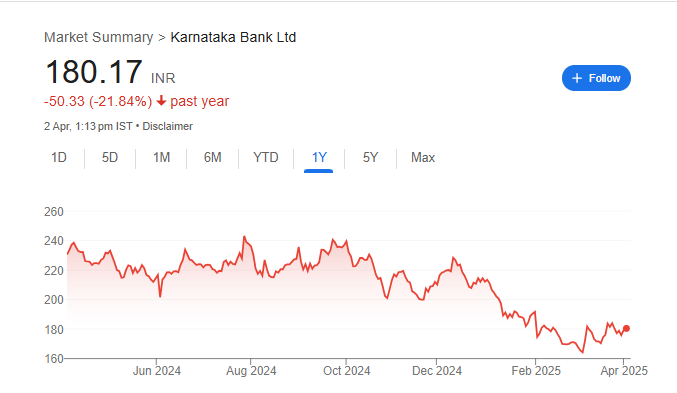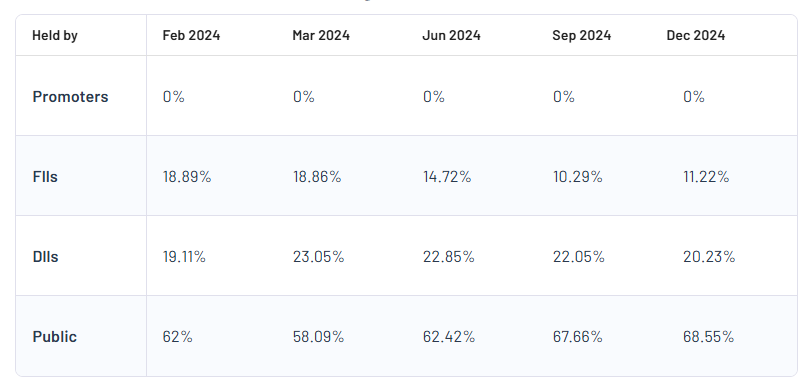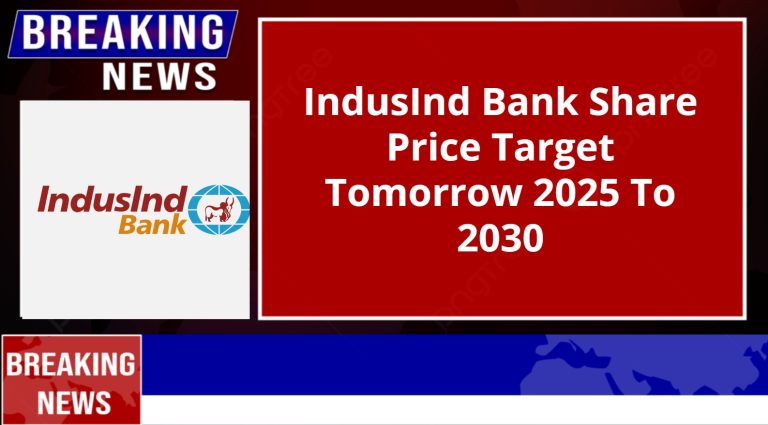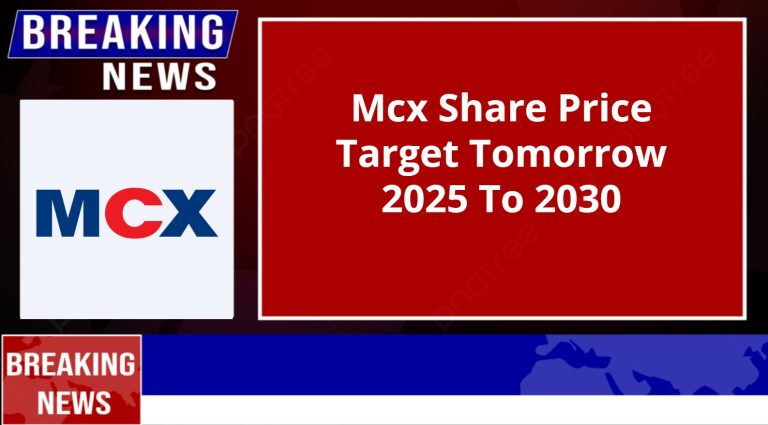Karnataka Bank Share Price Target Tomorrow 2025 To 2030
Karnataka Bank is a well-established private sector bank in India, providing various banking and financial services to individuals and businesses. Its shares are traded on the stock market, attracting investors looking for stable banking sector opportunities. The bank has a strong presence in South India and is expanding its digital banking services. Karnataka Bank Share Price on NSE as of 2 April 2025 is 180.17 INR.
Current Market overview of Karnataka Bank Share Price
- Open: 179.20
- High: 180.81
- Low: 177.53
- Previous Close: 179.20
- Volume: 273,082
- Value (Lacs): 492.28
- VWAP: 179.36
- Mkt Cap (Rs. Cr.): 6,813
- Face Value: 10
- UC Limit: 215.04
- LC Limit: 143.36
- 52 Week High: 245.00
- 52 Week Low: 162.20
Karnataka Bank Share Price Target Tomorrow 2025 To 2030
| Karnataka Bank Share Price Target Years | Karnataka Bank Share Price |
| 2025 | INR 250 |
| 2026 | INR 280 |
| 2027 | INR 310 |
| 2028 | INR 340 |
| 2029 | INR 370 |
| 2030 | INR 400 |
Karnataka Bank Share Price Chart

Karnataka Bank Shareholding Pattern
- Promoter: 0%
- FII: 11.22%
- DII: 20.23%
- Public: 68.55%

Key Factors Affecting Karnataka Bank Share Price Growth
-
Financial Performance
Karnataka Bank’s share price depends on its revenue, profit margins, and asset quality. Strong quarterly and annual results, including higher net profit and lower non-performing assets (NPAs), can boost investor confidence and push the stock price up. -
Loan Growth & Credit Demand
The bank’s ability to expand its loan book, especially in retail and SME sectors, directly impacts its earnings. A rising demand for loans, supported by economic growth, helps in revenue expansion, leading to potential stock price growth. -
Interest Rate Movements
Changes in interest rates set by the Reserve Bank of India (RBI) affect Karnataka Bank’s net interest income. Higher interest rates can improve margins, while lower rates may attract more borrowers, impacting the stock price accordingly. -
Branch & Digital Expansion
The bank’s strategy to expand its branch network and strengthen digital banking services can attract more customers. Investments in technology for mobile banking, UPI payments, and net banking can improve operational efficiency and enhance growth prospects. -
Economic Conditions
A strong economy with rising consumer spending and industrial growth supports banking sector expansion. If the Indian economy performs well, Karnataka Bank can see higher loan disbursement and better asset quality, benefiting its share price. -
Regulatory & Policy Changes
Government policies, RBI regulations, and banking sector reforms play a crucial role in Karnataka Bank’s operations. Favorable policies, such as incentives for private banks or lower tax rates, can positively impact the share price. -
Investor Sentiment & Market Trends
General market conditions, investor confidence in the banking sector, and trends in banking stocks affect Karnataka Bank’s valuation. If the overall market is bullish, banking stocks, including Karnataka Bank, may witness upward movement.
Risks and Challenges for Karnataka Bank Share Price
-
Rising Non-Performing Assets (NPAs)
If borrowers fail to repay loans, the bank’s non-performing assets (NPAs) increase. A high NPA level weakens financial stability and reduces investor confidence, leading to a potential decline in the share price. -
Economic Slowdown
If the Indian economy slows down due to inflation, global uncertainties, or weak demand, it can affect the banking sector. Lower credit demand and higher default risks can impact Karnataka Bank’s growth, affecting its stock price. -
Regulatory Risks
The banking sector is highly regulated by the Reserve Bank of India (RBI). Any sudden policy changes, such as stricter lending rules, increased capital requirements, or higher provisioning norms, can impact Karnataka Bank’s profitability and stock performance. -
Competition from Larger Banks & Fintechs
Karnataka Bank faces strong competition from bigger private banks and emerging fintech companies. If customers prefer larger banks or digital payment platforms for loans and banking services, it could limit the bank’s growth and impact its stock price. -
Interest Rate Volatility
Fluctuations in interest rates directly affect the bank’s net interest income. A sharp increase in interest rates may reduce borrowing demand, while lower rates could shrink margins, affecting overall profitability and investor sentiment. -
Stock Market & Investor Sentiment
The banking sector is influenced by overall stock market trends. If market conditions turn bearish or investors lose confidence in banking stocks, Karnataka Bank’s share price could face downward pressure. -
Cybersecurity & Digital Risks
As the bank expands its digital services, risks related to cyberattacks, data breaches, or technical failures increase. Any major security incident could damage its reputation, lead to financial losses, and negatively impact the share price.
Read Also:- V2 Retail Share Price Target Tomorrow 2025 To 2030







